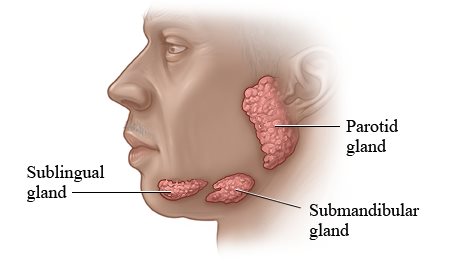Do you have a painful lump in your mouth or discomfort while eating? If so, you might have a problem with one of your salivary glands. At ENT Specialists of Austin, salivary gland surgery is one of the many procedures offered by our team of Physicians at their locations in Austin and Cedar Park, Texas.
To have your symptoms diagnosed by an expert, call the office today or book an appointment online using the one-click scheduler.

Salivary Gland Surgery Q & A
What is Salivary Gland Surgery?
Your salivary glands produce saliva that lubricates your mouth and begins the food digestion process. If one of these glands has a stone or tumor, it may be necessary to remove the mass with a surgical procedure.
The size and the location of the tumor or cyst determine how your physician performs the surgery. In some cases, ultrasound waves are used to break the stone into smaller pieces for easier removal. If it’s not possible to remove a large stone, your physician might opt to remove the entire salivary gland.
When is Salivary Gland Surgery Necessary?
When a salivary gland is obstructed, you might experience painful swelling. This pain typically occurs during meals, when saliva is being produced. Obstruction can also lead to infection in the gland.
The most common cause of salivary obstruction is a salivary stone, also called a sialolith. Sialoliths affect about 1% of the population. These small stones grow slowly over time, blocking salivary ducts, preventing the flow of saliva, and leading to gland infections.
Other causes of salivary gland obstruction that might necessitate surgery include infections, strictures, and radioactive iodine therapy, which is used to treat thyroid cancers.
What Can I Expect with Salivary Gland Surgery?
At ENT Specialists of Austin, our team of Physicians are experts at salivary gland removal for masses, large stones, and chronic infections. The delicate anatomy of these glands requires obsessive attention to detail when dealing with these crucial structures and performing surgery.
Dr. Nason has brought the new technique of sialendoscopy to Austin. As the first surgeon to perform sialendoscopy in the city, he can remove salivary stones through your natural salivary ducts. He can still remove larger stones, sometimes with a combination of several methods, so that complete gland removal is avoided about 90% of the time.
After your surgery, you may experience some weakness or numbness in the face. If you have sutures, your physician removes them within about 7-10 days.
To request a consultation about salivary gland surgery with ENT Specialists of Austin, book an appointment online or call the office today.
